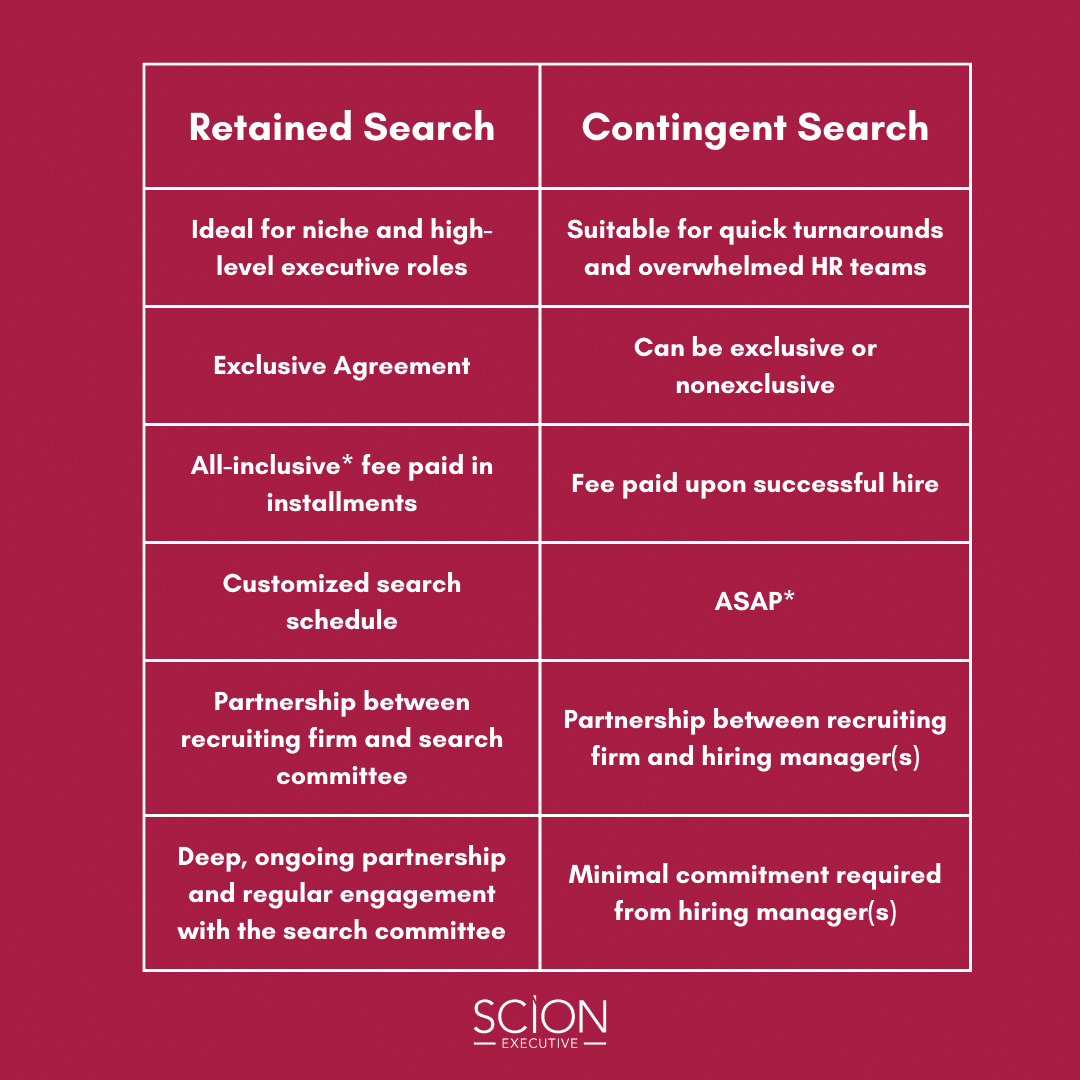
13 Dec Navigating Executive Recruitment: Retained versus Contingent Search Models
When enlisting the services of a recruitment firm to fill key roles, organizations confront a crucial decision: conducting either a contingent or retained executive search. While both recruitment models share the common goal of securing top-tier executives, they differ significantly in their approaches.
Retained and contingent recruitment models have their merits and are effective in different scenarios, but how do you determine which is right for your organization? In this blog, we’ll explore the nuances of these two approaches, uncovering each model’s unique benefits to organizations hiring critical executive leadership.
Retained versus Contingent: What’s the Difference?
Although these executive search models share a common goal, their approaches to identifying crucial leadership talent differ.
The retained search model is a tailored, end-to-end solution that provides support and guidance at every step of the recruitment process. When you engage a retained recruitment firm for your hiring needs, you gain a strategic partner who deeply understands your industry and your organization’s needs. This partner oversees every aspect of the executive search process for you, from crafting a polished position announcement to sourcing, vetting, and assembling a pool of top-notch talent and beyond. Think of this model as an all-inclusive outsourcing solution that handles the entire process, including collaborating with your internal leadership team, building the talent pipeline, evaluating all talent, and driving the process to a successful conclusion.
Retained services include organizational strategy support throughout the search. You can expect guidance for successful recruitment, regular progress updates, and ongoing support in addressing your questions and needs—all contributing to your organization’s strategic growth. Retained searches excel at filling critical leadership and niche roles and consistently yield a pool of highly qualified candidates. They can be so effective that a client organization may hire additional candidates from the pool for other vacancies or even create new roles for the talent presented to strengthen their team.
Retained searches traditionally entail an exclusive agreement and a pricing structure that is pre-set and agreed upon before the launch of the search. This exclusivity guarantees an unwavering dedication to finding the best candidate, and the fee (called a retainer) is typically paid in three parts, some of which are upfront, with a final payment that becomes due when the selected candidate begins their first day of work. These searches are led by industry experts, as not every recruitment firm possesses the required expertise, candidates’ network, specialization, or track record to justify upfront payments. Like lawyers or other professionals, the best results often come when you invest and make a commitment to your partnership upfront.
In the industry, it is widely recognized that the most prestigious jobs and employers exclusively rely on retained search firms due to their expertise. Consequently, leveraging a retained search firm can enhance your recruiting efforts by conveying a strong and influential recruiting presence. Top candidates and leaders in the market are accustomed to working with retained search processes, and deviating from this approach may discourage the most competitive executive leadership talent.
The contingent search model, on the other hand, provides a less robust and service-oriented approach to recruitment. This model typically does not include extensive candidate networking and the additional services offered in a retained search, such as assistance with preparation and strategy through services like job description refinement, search schedule creation, and ongoing support for the hiring committee. As a result, this search option is ideal for organizations aiming for a quick turnaround with limited collaboration, particularly in less demanding search scenarios. You can expect contingent services to include at least one group of talent ranging from three to five candidates, candidate salary expectation insights, reference verifications, and support in delivering your job offer to any of the candidates they submit to you.
In this model, the fee is not invoiced until an individual is selected for a role and begins their first day of work. This makes contingency recruiting an attractive option for organizations hesitant to pay a partial or up-front fee. Organizations working under this model can work with a recruitment firm exclusively (if the employer agrees to a container fee) or on a non-exclusive basis (if there is no up-front fee), providing flexibility in how your organization chooses to collaborate. This approach offers a broader reach that is ideal for organizations seeking swift executive staffing solutions or those with overwhelmed HR teams.
Key Differences at a Glance

The Benefits of Retained Searches
You receive a tailored, full-service package from start to finish. An executive recruitment firm offering this level of service will guide you through every facet of the search and each step of the way, from sourcing and screening to the final selection of candidates. This comprehensive service includes extensive screening and interviewing, adding significant value regarding industry expertise, time, and resources.
You gain a strategic partner and consultant. A retained search firm will immerse themselves in your organization’s intricacies to align with your strategic vision, ensuring a comprehensive understanding of your unique requirements. As a result, you relieve your team of the heavy lifting involved in the hiring process. The consultant will work directly with your leadership team and deliver you results.
You can customize the timeline according to your preferences. Retained searches offer flexibility in their timeline. You can proceed as swiftly as your organization and hiring committee allow.
You gain access to an impartial third party. Your recruitment partner will serve as a neutral mediator, providing sound reasoning for selecting the most qualified candidates based on merit rather than opinion. This benefit is particularly advantageous when addressing sensitive or politically charged situations.
You delegate intricate and specialized searches to a reliable partner. Conducting an executive search via a recruitment firm lets your organization focus on its core strengths and functions, freeing up employee bandwidth and ensuring your organization runs smoothly and at its best.
You benefit from robust networking and uncovering the best talent on the market. Retained searches dedicate significant time and effort to quickly and thoroughly identifying executives who are likely not actively seeking new leadership opportunities. Retained firms place the job opportunity in front of qualified leaders with the expertise an organization needs to achieve its strategic goals.
You gain access to more extensive candidate networks. The consultants leading retained searches are experts. They specialize in specific types of searches and offer the benefit of networking with hundreds of thousands of candidate connections from their established public and private networks.
The Benefits of Contingent Searches
You receive a cost-effective service for executive recruitment. With this model, you don’t pay a search fee until a candidate is successfully placed and starts working for you. This can be an attractive option for organizations operating within limited budgets or those hesitant to make an up-front financial commitment.
You gain a recruitment team that understands your fundamental needs and swiftly gathers a qualified pool of candidates for your review. Contingent searches are optimal for organizations with well-defined processes and a clear vision of their recruitment goals. This is because contingent services offer focused assistance instead of continuous guidance throughout the recruitment process.
You can fulfill critical hiring needs quickly. The contingent recruiting model is traditionally known for its quick turnarounds, allowing organizations to promptly address urgent personnel needs and expedite the hiring process.
You benefit from improved and streamlined candidate communication. Contingent searches simplify communication by adhering to a standardized approach in placing candidates. Your search partner serves as a reliable point of contact, managing schedules and communication on your behalf. This method ensures efficient hiring and maximizes results in a shorter timeframe.
The Choice That Suits Your Needs
In executive recruitment, choosing between the retained and contingent search models is an important decision, demanding thoughtful consideration from organizations seeking to secure top-tier leaders. As we’ve explored these two approaches, it has become evident that each model brings unique benefits, and both are well-positioned to meet organizational needs and preferences.
The retained search model is a comprehensive and exclusive service that offers deep networking, larger candidate slates, flexibility, impartiality, and specialized expertise, making it an ideal choice for those looking to fill critical leadership roles or niche roles with precision. Your partnership extends beyond a mere transaction, with the recruitment firm immersing itself in the nuances of your industry and your organization’s specific requirements. Retained search firms take care of all the details of the search for your leadership team and deliver results while keeping you updated on their progress every step along the way.
Conversely, the contingent search model provides a streamlined and cost-conscious solution, especially appealing to organizations operating within budget constraints or those that do not stand to benefit from deep industry networking or full search services. This model swiftly assembles a smaller slate of quality candidates, quickly resolving urgent personnel vacancies. The payment structure aligns with successful placements, making it a pragmatic choice for those hesitant to commit upfront. However, the contingent model can have its drawbacks, including the potential for less experienced recruiters spearheading searches and less prestigious and specialized firms taking the lead. In addition, this model has a reputation for offering candidate slates that may not be as diverse or robust as retained search.
Still Unsure? Or Want to Learn More About How an Award-Winning Search Firm Can Help You Hire the Best Leader? Work with Scion Executive Search!
When deciding between retained and contingent recruiting services, the key lies in aligning with your organization’s specific requirements. Whether you seek a partner to guide you through the entire hiring process or require support in pinpointing high-quality candidates, an executive search service will suit your needs. Scion Executive Search is ready to assist you in finding the perfect fit if you require expert assistance! Contact us today to initiate your search.
About the Author
Jennifer Warren, Technical Writer (she/her/hers)
Jennifer Warren is an enthusiastic and meticulous technical writer at Scion Executive Search (SES). Committed to excellence and constant growth, Jennifer draws on her strong editorial and organizational skills to expedite executive searches for businesses and organizations. Those who work with Jennifer praise her for her initiative, strong language skills, transparent communication, and enthusiasm to support her clients and colleagues.
Jennifer has spent most of her career in the publishing industry. Before joining SES, she worked at a crafts book publisher for seven years, first as a production editor, preparing manuscripts for print, and then as an associate editor, curating content for new publications. Jennifer has also worked in the nonprofit sector as a grant writer, preparing and submitting applications for program funding. She graduated Summa Cum Laude from California State University East Bay with a Bachelor of Arts in English.


